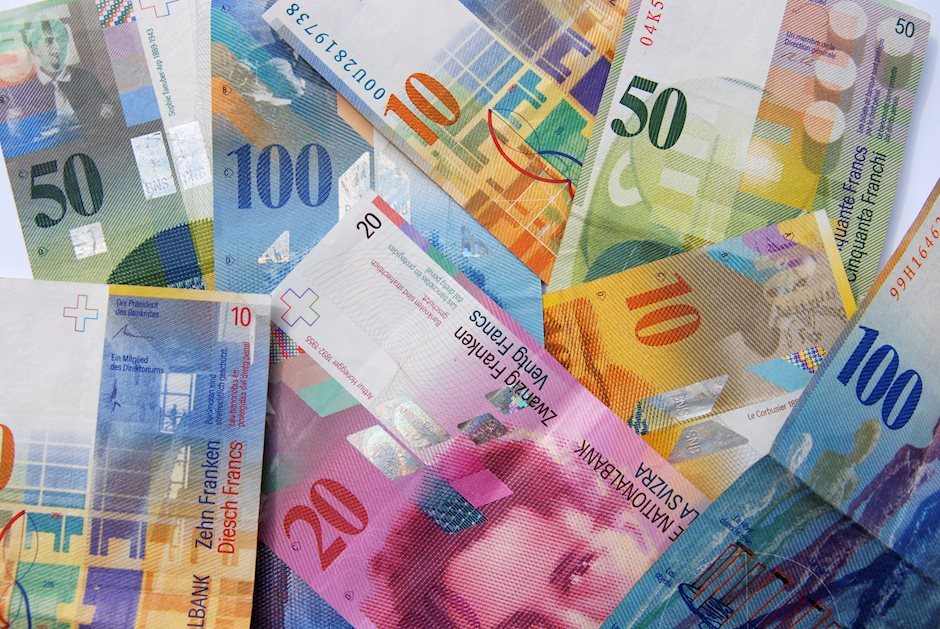Created
: 2024.11.29














![]() 2024.11.29 14:28
2024.11.29 14:28
The USD/CHF pair loses ground to near 0.8815 during the early European session on Friday, weighed by the softer US Dollar (USD) broadly. Traders await Switzerland's Gross Domestic Product (GDP) for the third quarter (Q3), which is due later on Friday.
The Greenback weakens as the profit-taking sets in before a long Thanksgiving weekend. The encouraging US economic data and the cautious stance from the US Federal Reserve (Fed) might support the USD in the near term. The FOMC Minutes released on Tuesday showed that Fed officials see interest rate cuts ahead but at a gradual pace as inflation eases and the labor market remains strong.
Switzerland's third-quarter GDP report will take center stage on Friday. The Swiss economy is expected to expand by 0.4% QoQ in Q3, compared to 0.7% growth in the second quarter. On an annual basis, the Swiss GDP is estimated to remain steady at 1.8% in Q3. In case of a weaker-than-expected outcome, this could undermine the Swiss Franc (CHF) and act as a tailwind for USD/CHF.
Elsewhere, Russia on Thursday unleashed its second big attack on Ukraine's energy infrastructure this month, triggering deep power cuts across the country. An escalation in the Russia-Ukraine war could boost the safe-haven currency like the CHF against the Greenback.
The Swiss Franc (CHF) is Switzerland's official currency. It is among the top ten most traded currencies globally, reaching volumes that well exceed the size of the Swiss economy. Its value is determined by the broad market sentiment, the country's economic health or action taken by the Swiss National Bank (SNB), among other factors. Between 2011 and 2015, the Swiss Franc was pegged to the Euro (EUR). The peg was abruptly removed, resulting in a more than 20% increase in the Franc's value, causing a turmoil in markets. Even though the peg isn't in force anymore, CHF fortunes tend to be highly correlated with the Euro ones due to the high dependency of the Swiss economy on the neighboring Eurozone.
The Swiss Franc (CHF) is considered a safe-haven asset, or a currency that investors tend to buy in times of market stress. This is due to the perceived status of Switzerland in the world: a stable economy, a strong export sector, big central bank reserves or a longstanding political stance towards neutrality in global conflicts make the country's currency a good choice for investors fleeing from risks. Turbulent times are likely to strengthen CHF value against other currencies that are seen as more risky to invest in.
The Swiss National Bank (SNB) meets four times a year - once every quarter, less than other major central banks - to decide on monetary policy. The bank aims for an annual inflation rate of less than 2%. When inflation is above target or forecasted to be above target in the foreseeable future, the bank will attempt to tame price growth by raising its policy rate. Higher interest rates are generally positive for the Swiss Franc (CHF) as they lead to higher yields, making the country a more attractive place for investors. On the contrary, lower interest rates tend to weaken CHF.
Macroeconomic data releases in Switzerland are key to assessing the state of the economy and can impact the Swiss Franc's (CHF) valuation. The Swiss economy is broadly stable, but any sudden change in economic growth, inflation, current account or the central bank's currency reserves have the potential to trigger moves in CHF. Generally, high economic growth, low unemployment and high confidence are good for CHF. Conversely, if economic data points to weakening momentum, CHF is likely to depreciate.
As a small and open economy, Switzerland is heavily dependent on the health of the neighboring Eurozone economies. The broader European Union is Switzerland's main economic partner and a key political ally, so macroeconomic and monetary policy stability in the Eurozone is essential for Switzerland and, thus, for the Swiss Franc (CHF). With such dependency, some models suggest that the correlation between the fortunes of the Euro (EUR) and the CHF is more than 90%, or close to perfect.
![]()
Created
: 2024.11.29
![]()
Last updated
: 2024.11.29

FXStreet is a forex information website, delivering market analysis and news articles 24/7.
It features a number of articles contributed by well-known analysts, in addition to the ones by its editorial team.
Founded in 2000 by Francesc Riverola, a Spanish economist, it has grown to become a world-renowned information website.
We hope you find this article useful. Any comments or suggestions will be greatly appreciated.
We are also looking for writers with extensive experience in forex and crypto to join us.
please contact us at [email protected].
Disclaimer:
All information and content provided on this website is provided for informational purposes only and is not intended to solicit any investment. Although all efforts are made in order to ensure that the information is correct, no guarantee is provided for the accuracy of any content on this website. Any decision made shall be the responsibility of the investor and Myforex does not take any responsibility whatsoever regarding the use of any information provided herein.
The content provided on this website belongs to Myforex and, where stated, the relevant licensors. All rights are reserved by Myforex and the relevant licensors, and no content of this website, whether in full or in part, shall be copied or displayed elsewhere without the explicit written permission of the relevant copyright holder. If you wish to use any part of the content provided on this website, please ensure that you contact Myforex.
Myforex uses cookies to improve the convenience and functionality of this website. This website may include cookies not only by us but also by third parties (advertisers, log analysts, etc.) for the purpose of tracking the activities of users. Cookie policy